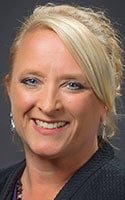Oswego Industries executive director heads nonprofit that supports 320 individuals with disabilities in Fulton. She talks about her challenges during the pandemic and why the agency has a list of 80 people waiting for services
By Mary Beth Roach

Laurie Davis has been the executive director of Oswego Industries since 2016 and served as director of finance for six years prior. She’ll celebrate her 26th anniversary with the agency this month.
Q: What is Oswego Industries and what does it do?
A: Oswego Industries is a private, not-for-profit agency located in Fulton, which has been dedicated to the provision of services and supports to people with disabilities since 1968. Our mission is to be a leader in the field of developmental disabilities, committed to meeting the needs of individual growth, productivity, and independence through the various services we provide. That includes education, advocacy, increased community acceptance and participation. We offer home and community-based supports to people, primarily but not exclusively with intellectual and/or developmental disabilities. Those supports include day habilitation, pre-vocational training, community habilitation, family support and services and supported employment.
Q: How are you affiliated with the Arc of Oswego?
A: The Arc of Oswego is a sister agency. The Arc of Oswego provides similar type services, including respite, community habilitation and day habilitation programs for seniors with disabilities. Together, the two agencies combine to provide a comprehensive support system for Oswego County residents with disabilities.
Q: How many people do you serve?
A: Currently the two agencies combined are supporting 320 individuals. We have 80 people on a wait list to return to the various programs due to our staffing shortage. OI is serving 220.
Q: How big is your staff?
A: Currently, our staff, between the two agencies, is 135 full-time employees and probably 30 part-time.
Q: What are some of the specific programs?
A: There are a couple of different divisions and different service offerings. We provide person-centered services, which would include the pre-vocational and vocational training. We provide supported employment. The employment services are provided on the model of skill development and growth. People often start out receiving the pre-vocational training and then, when they’re ready, they move on to a job in the community through supported employment. This really allows our individuals to gain confidence, job readiness.
Q: What is your budget and how are you funded?
A: Oswego Industries budget for ‘20-‘21 was $7.5 million. We are primarily funded by Medicaid for our services and grants and contracts through New York state. We are also funded through our commercial contract vendors in our integrated business. Integrated dusiness includes custodial and grounds maintenance. We manufacture various styles of textiles, including scrubs, hospital gowns. We have a belt manufacturing division. We do warehousing. We are assembling air purifiers, and we also have a document imaging division.
Q: Can people purchase the scrubs and belts at area shops?
A: We’ve been a contract manufacturer at Oswego Industries over at least the 10 years and have provided over 200,000 belts to organizations in the public and private sector. In 2019, our OI Wear line was created to enter the consumer market. OI Wear is the apparel division of Oswego Industries and it really exists to support the overall mission of the agency and provide training and employment opportunities to the people we support. Part of the development of this line was an ability to partner with Syracuse University and Dyehard Fan Supply. We’re now an official licensed online and retail supplier of the OI Wear Game Day belt.
Q: Where can people buy these?
A: Our belts are available in some of the local shops in the city of Fulton and Oswego. You can purchase them from our website [oi-wear.com]. The SU Game Day Belt will be available at The Dome and the Dyehard Fan Supply website. We’ve produced scrubs for the local nuclear plants over the years. At the beginning of the pandemic, we were able to pivot our operations and we supplied hospital gowns and face masks to a lot of the local healthcare providers. We were fortunate to be deemed an essential business, which allowed us to continue and changed our whole textile line.
Q: What are some of the challenging aspects of your job?
A: The pandemic has created challenges I truly don’t think that any of us were prepared for. I’ve been proud of what our team has been able to accomplish, navigating the constantly changing regulations and health and safety mandates. Every time something was addressed in a regulation, it’s a policy update, it’s a procedure change. That truly has been the biggest challenge of my career.
Q: What are some of the more rewarding aspects of your job?
A: Seeing the impact that we have in families’ lives. The supports that we provide enable them to work and live their lives, while continuing to care for their child or adult with a disability. Our staff makes a huge difference in the lives of the people we support every day. It’s extremely rewarding. When we hear those success stories or feedback from the families, and how much they’re appreciative – it’s just an amazing thing to be a part of.

